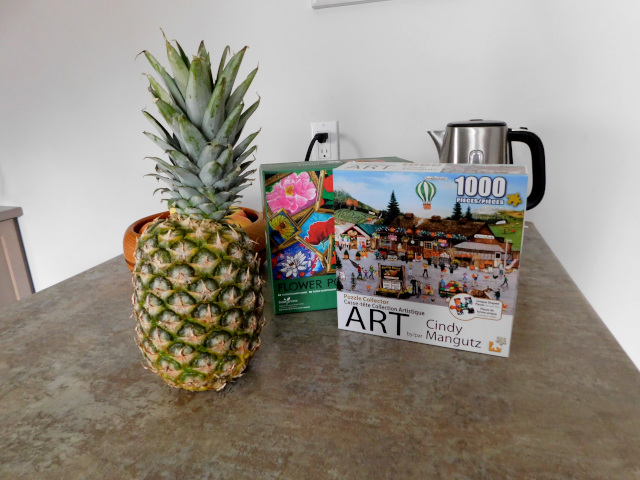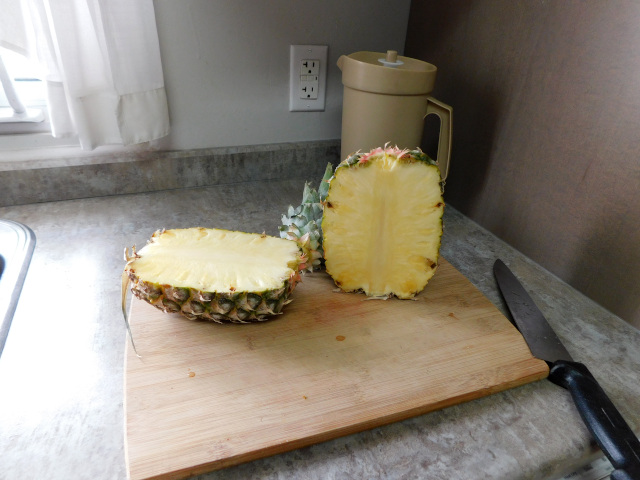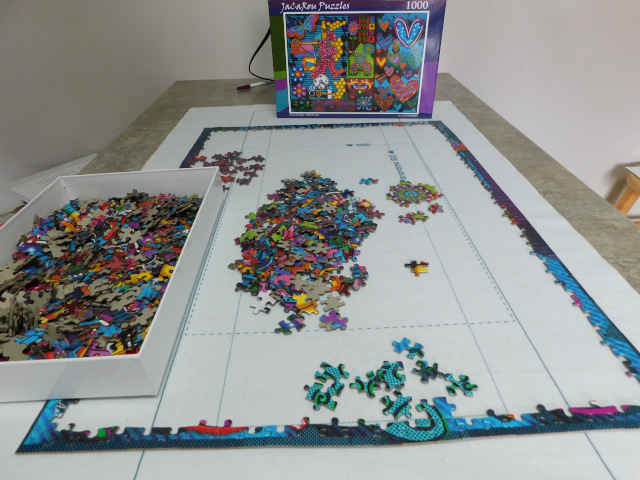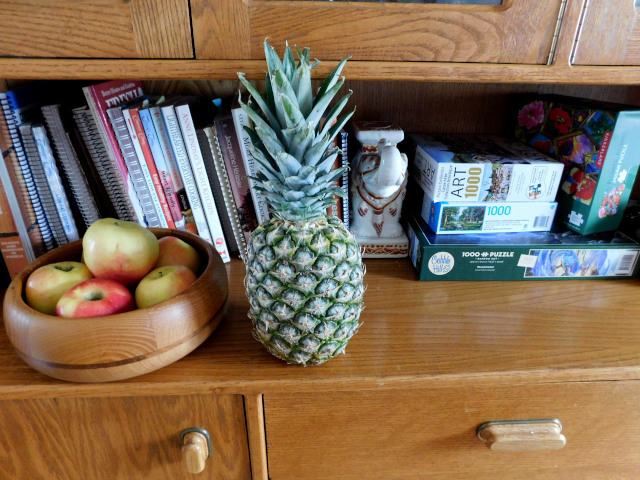It is a serious thing
just to be alive
on this fresh morning
in the broken world. (Mary Oliver)

Cutting up pineapples is inherently messy and time-consuming. That means everyone has an opinion on how it should be done.


A recent observation from a guest (yes, we are beginning to have those!)—“okay, that’s neater than the way I do it, but I can do it faster”—provoked me into a defensive “and why, precisely, should I do it faster? Just so that I can get it done and then move onto something else that I will also do as fast as possible just to get it done?”
If everything I do in a day is done just to get it done, what have I done that was joyous in the doing?
Putting together jigsaw puzzles has somehow raised the same question.
I must be one of those rare people who prefer doing jigsaw puzzles alone. There’s a story that needs to be told here in self-defense. As a late-born (and therefore rather solitary) child on a farm, I didn’t have many opportunities to acquire necessary social skills. Mostly I played alone, when chores were finished. I was probably at least 13 when the first jigsaw puzzle ever came into my hands as a gift from a distant aunt.
The picture was one of those English cottages set in deep dark woods on the verge of autumn. It took me many long evenings before I got those 500 pieces into the right places. I was so absorbed I knew nothing of passing time until ordered to put out my light and get to bed. I admired the finished product for days, not wanting to take it apart, ever. Until the desire to put it together again won out.
Years later, in the family of the man who became my husband, I discovered that jigsaw puzzles were a family activity. Everybody gathered around to put pieces together. It wasn’t exactly a process I would describe as driven, but the plan was definitely to get it done. Meanwhile, stories were told, gossip was shared, snacks were fetched. Each person worked on one area and rejoiced when it could be attached to the whole. Sometimes it took a couple of evenings out of a weekend family gathering. That’s when I first noted the loss I felt when I saw that someone else had finished what I’d been working on.
There’s a reason that jigsaw puzzles became so popular during the early days of the pandemic. When all the world is falling apart and we’re denied our usual social distractions, the putting together of pieces to make something beautiful is soothing. It feels creative without the agony of actual creation. It gives us control, and meaning: we begin with chaos—a heap of fragments in a box—and end with a perfect order in which each tiny piece fits into its place.

For me, the putting together is the whole point. I own it all, both the chaos and the order. It is the doing I delight in; the “done” part is a form of good-bye.
Which is why I recently responded to a casual offer—“would you like us to help you get your puzzle finished?”—with a stammering, awkward refusal. It was a gracious social gesture, an entirely laudable wish to do something together, but just for a moment, I felt as if something that was mine was about to be taken away from me, as if the goal had co-opted the process.
My dilemma had a solution that made sense to me: I offered a different puzzle, still in its box. If I know from the get-go that the puzzle will be a communal effort, I happily join the being together, which is, in the end, even better than the putting together. Actually, the putting together becomes a different process when many eyes and hands find order in the midst of chaos. It is useful to be reminded, especially these days, that shared fragments are much less fragmented, less chaotic.

If I am to be happy with pineapples and jigsaw puzzles—and all manner of doings—I shall have to practice sorting out the doing from the done, and which is important when.
Working together with other people requires me to let go almost entirely of the final product. It may or may not be what I had envisioned. My perfectionism (sometimes a virtue, sometimes a grievous fault) needs to be held in check during the doing and completely set aside for the done. What matters is the warmth of shared effort, the laughter, the swapping of stories, the mutual encouragement. It helps me to see two processes at once: the task at hand which needs to get done, and the happy work of building friendships which needs doing even more (and luckily never arrives at a state of doneness).
When working alone on a task, I hope for wisdom to know just how important it really is to get it done. Is efficiency what matters? Is this just to get it done and out of the way? How often shall I let that urgency spoil the intrinsic pleasures of the doing? Surely I can take time oftener to feel the evanescent tickle of soap bubbles in the dish water, the soft yieldedness of bread dough taking shape under my hands, the miracle of color in cut fruit, the crumbling of soil in my fingers as I transfer a trembling wisp of a pansy into the next size of pot.

A pox on getting it all done just to get it done! A life lived deeply might be just as full as the life lived headlong forward.


